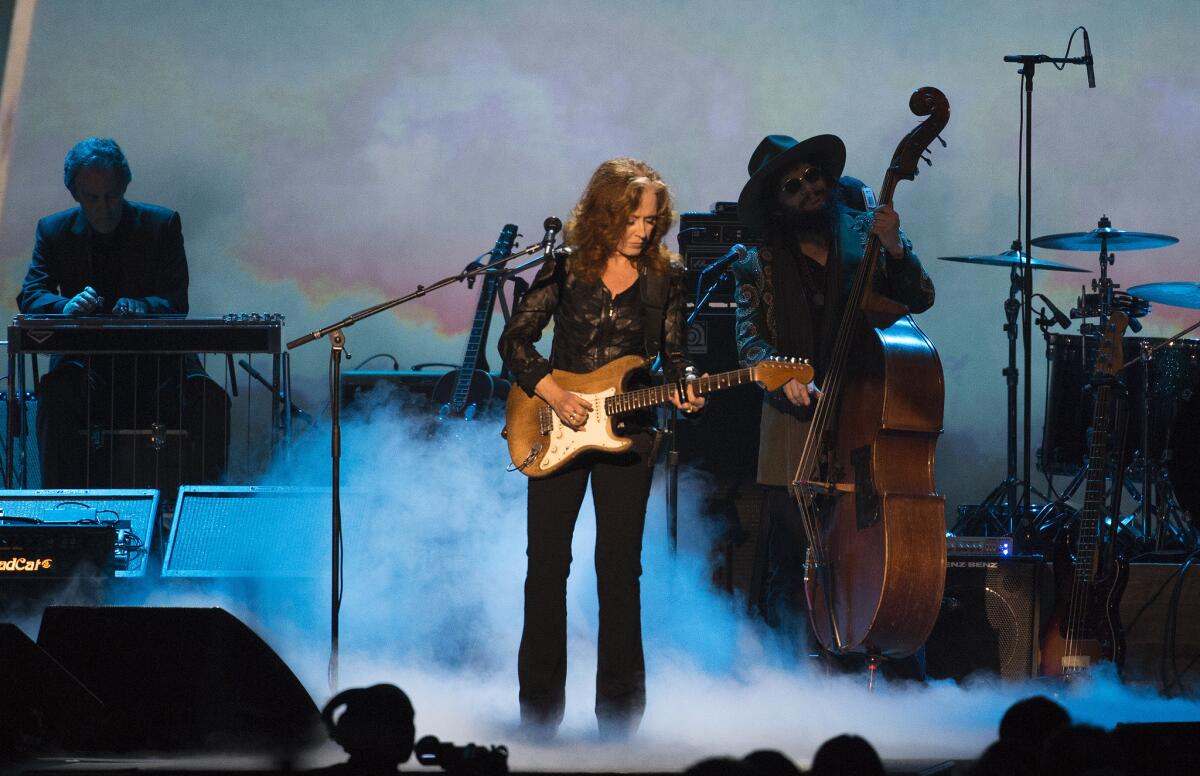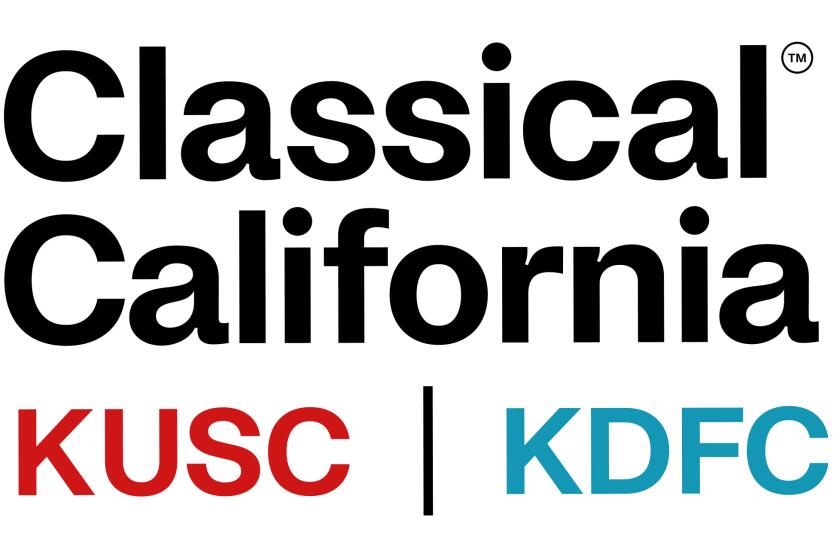Review: Grammys 2015: At MusiCares gala, Bob Dylan overshadows his admirers

- Share via
Not surprisingly given the honoree, a sense of mystery ran through the first 90 or so minutes of the annual Grammy-week MusiCares Person of the Year fundraising gala. As acts including Bonnie Raitt, Los Lobos, Neil Young, Bruce Springsteen, Norah Jones, John Doe and Tom Jones paid tribute by interpreting his songs, what role would this year’s Person, Bob Dylan, play?
------------
FOR THE RECORD:
Bob Dylan: In the Feb. 9 Calendar section, a review of MusiCares’ person-of-the-year tribute to Bob Dylan said that he and singer Merle Haggard nearly toured together in the ‘00s. In fact, they did tour together.
------------
The artist, 73, reportedly walked the red carpet, so we knew he was on-site. But he’s always been wary of this sort of spotlight. Would he watch from side stage? Was he in his dressing room banging out a speech on a typewriter like in “Don’t Look Back”?
When it was his turn to accept, would Dylan give a simple nod, a prepared address or a mumbled few mysterious words akin to those offered for his 1991 Grammy for lifetime achievement -- something about becoming “so defiled in this world that your own father and mother will abandon you”?
Who knew that on Friday night, he’d befuddle and delight the 3,000-odd black-tie-and-evening-gown attendees at the gala, which raises money for musicians in need, with a biting, funny, endlessly quotable and footnote-able speech that ran like an epic Dylan lyrical composition. Few could have imagined that he’d run through some of his classic lines with the same cadence and rhythms as those on the recordings. He doesn’t do that anymore.
Read the transcript of Bob Dylan’s MusiCares Person of the Year speech
Before that could happen, we waited, ate our iceberg lettuce and medley entrees around circular twelve-tops and drank table wine while onstage a tightly practiced gathering of some of music’s great session players, under the leadership of Don Was, offered a bed for the night’s many guests to lay down Dylan songs. They did.
Some were memorable: Jack White’s hard, jerky reworking of Dylan’s death march, “One More Cup of Coffee,” shined a light on a lesser known classic. Los Angeles band Los Lobos covered “On a Night Like This” from Dylan’s “Planet Waves,” just as they’d done for the Dylan-penned film “Masked and Anonymous.” Jackson Browne crawled through a perfect rendition of “Blind Willie McTell.”
John Doe of X crooned Dylan’s gospel song “Pressing On” like ‘68-comeback-era Elvis Presley. Tom Jones offered great depth to “What Good Am I?” Bonnie Raitt delivered the evening’s highlight, a simmering blues version of “Standing in the Doorway” that further revealed her genius both as a guitarist and a singer. “Don’t know if I saw you, if I would kiss you or kill you,” she sang. “It probably wouldn’t matter to you anyhow.”
But whether it was Grammy album of the year nominee Beck opening with a raucous version of “Leopard Skin Pillbox Hat,” or Neil Young closing the gala with a too-straight solo acoustic version of “Blowin’ in the Wind,” Dylan didn’t commingle onstage with any of the artists covering his work. He doesn’t do that anymore.
FULL COVERAGE: Grammy Awards 2015
And then, as we were eating dessert, former President Jimmy Carter came out and introduced the person of the year with a story about sitting down with Dylan during his time exploring Christianity, and the meaning of the song “You’re Gonna Have to Serve Somebody.”
Dylan walked to the podium holding a notable number of pages. Gazing uncomfortably down at his notes like he was giving a book report, he leaned into the microphone and thanked MusiCares and those responsible. Then he delivered a speech so freewheeling cutting and funny, honest, biting, critical, that I hope it’s an excerpt from his rumored follow-up to his book “Chronicles.”
Through 30-plus minutes of thoughts delivered from handwritten notes, he prompted laughs both uproarious and uncomfortable. He praised by name his heroes, early interpreters of his work and artistic enablers: Columbia A&R man John Hammond; Joan Baez; Peter, Paul and Mary; Jimi Hendrix; the Staple Singers; and unsung rockabilly hero Billy Lee Riley. He declared with conviction his belief in the power and importance of artistic license, and did so by comparing the old folk and blues tunes he loved as a youth with some of his classic lyrics.
Dylan expressed confusion as to why his songs were considered divisive, and named some of his peer critics. He slammed comments on songwriting by country songwriter Tom T. Hall (“Harper Valley P.T.A.”) by flatly reading lines from Hall’s treacly song “I Love.” Dylan defensively lashed out at Merle Haggard, an artist thought to be on his good side. (They nearly toured together in the mid-’00s.) He trash-talked Bakersfield country music.
He defended his singing voice by quoting Sam Cooke’s response to a compliment about having a “pretty” voice. “He said, ‘Well that’s very kind of you, but voices ought not to be measured by how pretty they are. Instead they matter only if they convince you that they are telling the truth.’ ”
Dylan added: “Critics say I can’t sing. I croak. Sound like a frog. Why don’t critics say that same thing about Tom Waits?” He name-checked Floyd Mayweather, Kris Kristofferson, Doc Pomus, Johnny Cash, Lou Reed, Sheryl Crow, Lieber & Stoller and Big Bill Broonzy. Dylan uttered the phrase, “Why me, Lord?” three times. He explained that the blues, “which is an American music, is not what you think it is. It’s a combination of Arabic violins and Strauss waltzes working it out.” Who knew?
Through it all, Dylan basically rendered the musical performances we’d just witnessed moot and left many of us sure we’d been in on a night we’d never forget, a tour de force of dry wit, wry commentary and snapshot stories.
Somebody get this guy a TED talk.
Follow Randall Roberts on Twitter: @liledit
More to Read
The biggest entertainment stories
Get our big stories about Hollywood, film, television, music, arts, culture and more right in your inbox as soon as they publish.
You may occasionally receive promotional content from the Los Angeles Times.











